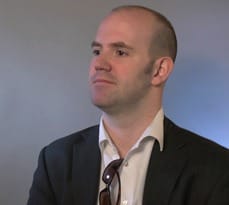Executive MBA programme helped inventor and alumnus Dr Eben Upton create a revolution in low-cost computing.
[vimeo id = 37264818]
The inventor of Raspberry Pi, a tiny low-cost computer which is about to hit the market, has no doubt that his Executive MBA programme at Cambridge Judge Business School helped turn his technical capability into developing a business.
There are two versions of the device which is the size of a credit card and priced at £16 and £22. When connected to a television and keyboard, it is capable of many desktop PC functions and also plays high-definition video.
Raspberry Pi is the brainchild of Dr Eben Upton, who says that as he embarked on his Executive MBA programme the idea was sound and the technical know-how was in place but missing were some of the ways of moving those forward.
“I had done a little software business in the past but certainly nothing in the volume manufacture of physical devices.
“The Executive MBA course helped me thinking about what we were doing in a more structured way rather than just muddling through. Thinking about how we develop the brand for the device, thinking about we work with partners and how we deal with some of the challenges that come with being ‘not for profit’ and therefore restricted in the ways in the ways you can raise capital at the same time as get a very large number of devices out.”
Dr Upton and colleagues at the Cambridge Computer Laboratory had been concerned at the declining figures for young people interested in computer science. Peaking in the mid-1990s at 500 people applying for 80 places each year to read computer science, by five years ago the number of applicants applying for the same number of places had halved.
That decline, says Dr Upton, was parallel to a decline in the skills and experience of the undergraduates taking the places. Many had tinkered with websites but few had touched programming.
This created a real problem because the University needs a good supply of potential candidates and does not want to spend the first year bringing people up to speed.
“Three years after it is a problem for the University it is a problem for industry because a decline in the number or skill set of applicants turns into decline in the number or skill set of graduates.”
Initially it was hoped that Raspberry Pi, by being aimed at children, would increase numbers looking to study computer science at university. Two additional markets have now emerged, one of which is the hacking or ‘maker’ community who already have some knowledge of the technology and want to build projects. The second market to emerge, says Dr Upton, was that of the developing world.
“We’ve had an enormous amount of interest particularly from the BRIC countries. A lot of interest from Brazil and Russia, less so from India and China, but a lot of interest from South America and sub-Saharan Africa.”
Dr Upton is a founder and trustee of the Raspberry Pi Foundation.


